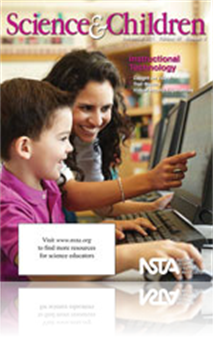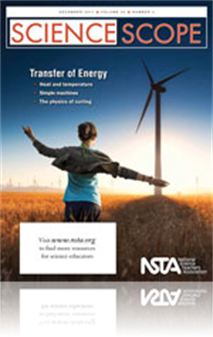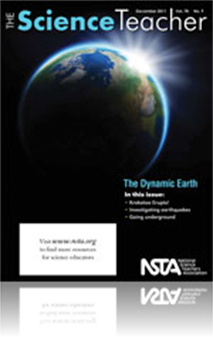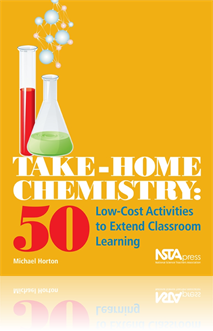All Resources
Journal Article
Formative Assessment Probes: Representing Microscopic Life
This column focuses on promoting learning through assessment. This month’s issue discusses the formative assessment probe "Pond Water," which reveals how elementary children will often apply what they know about animal structures to newly discovere...
Journal Article
Everyday Engineering: Clips and Clamps
This column provides an inside look at the marvels of engineering in everyday life. In this 5E learning cycle lesson, students investigate the design of simple, everyday binder clips and how they function....
Journal Article
Scope on Safety: Test Your Metal (Safety Knowledge)
This column shares safety information for your classroom. This month’s issue discusses the safety of various metals commonly used in middle school science lab activities....
Journal Article
This article describes how geologists investigate groundwater flow systems in areas of karst topography—geologic formations shaped by dissolving bedrock—and provides a way for students to replicate this research. Students also use electric curren...
Journal Article
This activity introduces students to the pros and cons of a renewable energy source, allowing them to experience how energy can change form from mechanical to electrical. Pairs of students are challenged to build a set of wind turbine blades that wil...
Journal Article
Safer Science: Lab Safety—A Shared Responsibility
This column provides best safety practices for the science classroom and laboratory. This month’s issue discusses responsibility for lab safety being in the hands of both the teacher preparatory institution and the school district....
Journal Article
Tried and True: Energy Scavenger Hunt
This column provides classic demonstrations and experiments with a new twist. This month’s issue describes an activity that was designed for our eighth-grade physics class to teach the concepts of how electricity is made and transported to the home...
Journal Article
Teaching About Heat and Temperature Using an Investigative Demonstration
This short and cost-effective lesson helps middle grade students learn about the transfer of thermal energy. The lesson comprises three activities: a predict-share-observe-explain sequence of instruction that elicits students' conceptions and piques ...
Journal Article
Editor's Note: Technology to Best Fit the Need
Science and Children’s editor shares thoughts regarding the current issue....
Journal Article
Students use handheld digital video cameras to support evidence-based reasoning as they design model rock-and-mortar walls. ...
Journal Article
Students design a vehicle made entirely out of pasta and hot glue to explore motion and force concepts....
Journal Article
Editor's Corner: Dynamic Earth
The Science Teacher’s editor shares thoughts on the current issue....
Journal Article
<i>Not</i> an Unfeasible "Extra"
Blogging helps elementary students communicate and reflect on their science practice....
Journal Article
Recognizing Excellence: Turtles and Technology
This column features profiles of award-winning science programs and teachers. In this month’s issue students are involved in a real-world problem: how to protect a threatened species and become its advocate....
Journal Article
Students use hair color to make a clear connection between genotype and phenotype. ...
Journal Article
Editor's Roundtable: A Positive Force in my Classroom
Science Scope’s editor shares thoughts regarding the current issue....
Journal Article
When knowledge about rock types is paired with interactive whiteboards for introductory instruction, the combination is an ideal fit for children and teachers....
Journal Article
Scientific and Engineering Practices in K–12 Classrooms
The author presents the science and engineering practices from the recently released A Framework for K–12 Science Education: Practices, Crosscutting Concepts, and Core Ideas....
Journal Article
Fourth-grade students create digital field guides for visitors to the school's nature trail....
Journal Article
Career of the Month: Physician Assistant
This column shares interviews with professionals using science in the workplace. In this month’s issue we learn about one physician assistant's experiences....
Journal Article
Science 101: Is It Possible to Turn Coal Into Diamonds?
This column provides background science information for elementary teachers. In this month’s issue the author discusses the properties of carbon....
Journal Article
Students build their own generator to study the transfer of energy. The generator activity allows students to observe electrical effects without using a battery or power supply....
Book Chapter
Separation Lab: Elements, Compounds, and Mixtures
In this activity, students will separate a mixture of sand, salt, Styrofoam (or Perlite), and iron....
Book Chapter
Probability of Finding an Electron
In this activity, students will use a target to simulate the probability of finding an electron in a certain energy level....
Book Chapter
In this activity, students will simulate the decay of radioactive isotopes by flipping papers and removing face-up papers....
Book Chapter
Rutherford’s Gold Foil Simulation
In this activity, students will simulate Rutherford’s gold foil simulation by rolling a marble (alpha particle) at a series of target marbles (gold atoms...
Book Chapter
In this activity, students will calculate the mean free path of a simulated gas sample....
Book Chapter
In this activity, students will see if the volume of an ice and water mixture goes up or down when the ice melts....
Book Chapter
In this activity, students will count how many drops of water they can put on the face of a penny with and without dishwashing liquid in the water....
Book Chapter
In this activity, students will estimate the density of cooking oil by comparing it to water...
Book Chapter
In this activity, students will perform paper chromatography on different inks to find the source of the ink....
Book Chapter
In this activity, students learn how to use a single-beam balance to determine the masses of objects. Students use the density of water to determine the mass needed to balance the objects....
Book Chapter
Mechanoluminescence: Making Things Light Up
In this activity, students will see how applying a force to a Wint-O-Green Life Saver causes it to light up....






